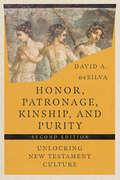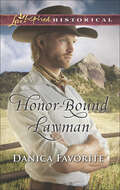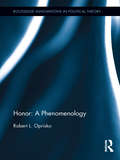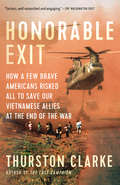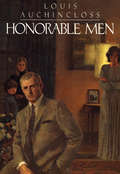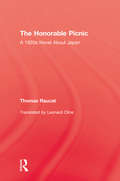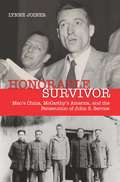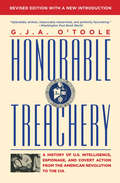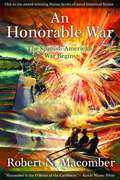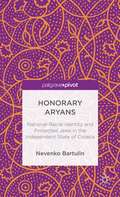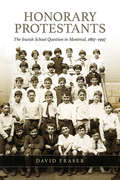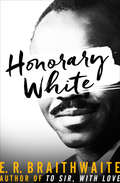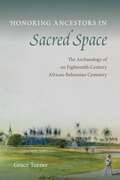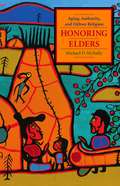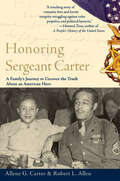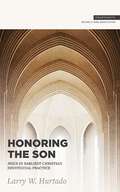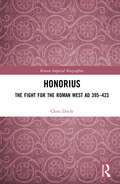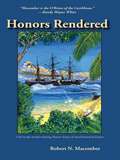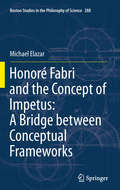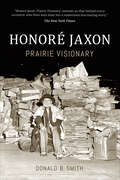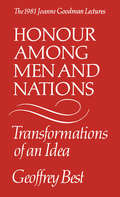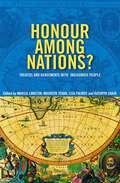- Table View
- List View
Honor, Patronage, Kinship, & Purity: Unlocking New Testament Culture
by David A. deSilvaFor contemporary Western readers, it can be easy to miss or misread cultural nuances in the New Testament.Through our understanding of honor and shame in the Mediterranean world, we gain new appreciation for how early Christians sustained commitment to a distinctive Christian identity and practice. By examining the protocols of patronage and reciprocity, we grasp more firmly the connections between God’s grace and our response. In exploring kinship and household relations, we grasp more fully the ethos of the early Christian communities as a new family brought together by God. And by investigating the notions of purity and pollution along with their associated practices, we realize how the ancient map of society and the world was revised by the power of the gospel.Honor, Patronage, Kinship, and Purity
Honor, Politics, and the Law in Imperial Germany, 1871-1914
by Ann GoldbergHonor in nineteenth-century Germany is usually thought of as an anachronistic aristocratic tradition confined to the duelling elites. In this innovative study Ann Goldberg shows instead how it pervaded all aspects of German life and how, during an era of rapid modernization, it was adapted and incorporated into the modern state, industrial capitalism, and mass politics. In business, state administration, politics, labor relations, gender and racial matters, Germans contested questions of honor in an explosion of defamation litigation. Dr Goldberg surveys court cases, newspaper reportage, and parliamentary debates, exploring the conflicts of daily life and the intense politicization of libel jurisprudence in an era when an authoritarian state faced off against groups and individuals from 'below' claiming new citizenship rights around a democratized notion of honor and law. Her fascinating account provides a nuanced and important new understanding of the political, legal and social history of imperial Germany.
Honor, Vengeance, and Social Trouble: Pardon Letters in the Burgundian Low Countries
by Walter Prevenier Peter ArnadeAmong the more intriguing documentary sources from late medieval Europe are pardon letters--petitions sent by those condemned for serious crimes to monarchs and princes in France and the Low Countries in the hopes of receiving a full pardon. The fifteenth-century Burgundian Low Countries and duchy of Burgundy produced a large cache of these petitions, from both major cities (Bruges, Ghent, Antwerp, and Dijon) and rural communities. In Honor, Vengeance, and Social Trouble, Peter Arnade and Walter Prevenier present the first study in English of these letters to explore and interrogate the boundaries between these sources' internal, discursive properties and the social world beyond the written text.Honor, Vengeance, and Social Trouble takes the reader out onto the streets and into the taverns, homes, and workplaces of the Burgundian territories, charting the most pressing social concerns of the day: everything from family disputes and vendettas to marital infidelity and property conflicts--and, more generally, the problems of public violence, abduction and rape, and the role of honor and revenge in adjudicating disputes. Arnade and Prevenier examine why the right to pardon was often enacted by the Burgundian dukes and how it came to compete with more traditional legal means of resolving disputes. In addition, they consider the pardon letter as a historical source, highlighting the limitations and pitfalls of relying on documents that are, by their very nature, narratives shaped by the petitioner to seek a favored outcome. The book also includes a detailed case study of a female actress turned prostitute. An example of microhistory at its best, Honor, Vengeance, and Social Trouble will challenge scholars while being accessible to students in courses on medieval and early modern Europe or on historiography.
Honor-Bound Lawman
by Danica FavoriteAn endangered woman finds safety and a second chance at love at an ex-lawman’s ranch in this inspirational historical romance.When Laura Booth’s dangerous ex-husband escapes from prison, she turns to the one man who can protect her: Owen Hamilton. Living with the widowed former lawman—who once helped put her ex in jail—and his adorable twin daughters on their Colorado ranch is a welcome respite. For the first time, Laura feels safe—but after her troubled past, she’ll never trust her heart again.Owen would like to say only obligation draws him to Laura’s side. But in his gut he knows his feelings for the gentle beauty run deeper than duty—and it stops him cold. After guarding their wary hearts for years, can Owen and Laura give love a second chance?
Honor: A Phenomenology (Routledge Innovations in Political Theory)
by Robert L. OpriskoHonor is misunderstood in the social sciences. The literature lacks both accuracy and precision in its conceptual development such that we no longer say what we mean because we have no idea what we’re saying. We use many terms to mean honor and mean many different ideas when we refer to honor. Honor: A Phenomenology is designed to fix all of these problems. A ground-breaking examination of honor as a metaphenomenon, this book incorporates various structures of social control including prestige, face, shame and affiliated honor and the rejection of said structures by dignified individuals and groups. It shows honor to be a concept that encompasses a number of processes that operate together in order to structure society. Honor is how we are inscribed with social value by others and the means by which we inscribe others with social honor. Because it is the means by which individuals fit in and function with society, the main divisions internal (within the psyche of the individual and external (within the norms and institutions of society). Honor is the glue that holds groups together and the wedge that forces them apart; it defines who is us and who them. It accounts for the continuity and change in socio-political systems.
Honorable Exit: How a Few Brave Americans Risked All to Save Our Vietnamese Allies at the End of the War
by Thurston ClarkeA groundbreaking revisionist history of the last days of the Vietnam War that reveals the acts of American heroism that saved more than one hundred thousand South Vietnamese from communist revengeIn 1973 U.S. participation in the Vietnam War ended in a cease-fire and a withdrawal that included promises by President Nixon to assist the South in the event of invasion by the North. But in early 1975, when North Vietnamese forces began a full-scale assault, Congress refused to send arms or aid. By early April that year, the South was on the brink of a defeat that threatened execution or years in a concentration camp for the untold number of South Vietnamese who had supported the government in Saigon or worked with Americans. Thurston Clarke begins Honorable Exit by describing the iconic photograph of the Fall of Saigon: desperate Vietnamese scrambling to board a helicopter evacuating the last American personnel from Vietnam. It is an image of U.S. failure and shame. Or is it? By unpacking the surprising story of heroism that the photograph actually tells, Clarke launches into a narrative that is both a thrilling race against time and an important corrective to the historical record. For what is less known is that during those final days, scores of Americans--diplomats, businessmen, soldiers, missionaries, contractors, and spies--risked their lives to assist their current and former translators, drivers, colleagues, neighbors, friends, and even perfect strangers in escape. By the time the last U.S. helicopter left Vietnam on April 30, 1975, these righteous Americans had helped to spirit 130,000 South Vietnamese to U.S. bases in Guam and the Philippines. From there, the evacuees were resettled in the U.S. and became American citizens, the leading edge of one of America's most successful immigrant groups. Into this tale of heroism on the ground Clarke weaves the political machinations of Henry Kissinger advising President Ford in the White House while reinforcing the delusions of the U.S. Ambassador in Saigon, who, at the last minute, refused to depart. Groundbreaking, page-turning, and authoritative, Honorable Exit is a deeply moving history of Americans at a little-known finest hour.
Honorable Men
by Louis AuchinclossFrom a New York Times–bestselling author: A novel about a member of the Greatest Generation wrestling with moral choices over the next generation&’s war in Vietnam. Chip Benedict appeared to have the best of everything: wealth, education, good looks, charm, and intelligence. Shortly before entering law school, he married Alida, a pale beauty who also had the cunning and talent to become the debutante of the year, escaping the progressively threadbare world of tarnished elegance and unpaid bills to which she was born. Alida&’s life continued in a storybook fashion with her marriage to Chip, a seemingly perfect and certainly honorable man. Called to serve in World War II, he returned a hero, decorated for bravery at the Normandy landing. Following in his father&’s footsteps, he became chairman of the board of the prestigious Benedict Glass Company founded by his grandfather. And yet, with all of his gifts, Chip is haunted by dark guilt that drives him to excel, conform, and embrace a righteousness that he fails to perceive as hypocrisy. In business he becomes the perfect corporate executive, lauded in Fortune and Forbes. He serves his community, supports the arts, and patriotically honors his government. But when it comes to choosing sides on the issue of Vietnam, he will make a decision that casts aside the deepest ties and loyalties of his life. &“Through a series of flashbacks the narrators come to realize how outside events have influenced their lives. Auchincloss uses their story to show us the frailties of human nature when confronted with politics and morality. This psychological novel is perceptive, elegantly spare, and well crafted.&” —Library Journal
Honorable Picnic: A 1920s Novel About Japan
by RaucatFirst published in 2010. Routledge is an imprint of Taylor & Francis, an informa company.
Honorable Survivor
by Lynne JoinerHonorable Survivor weaves John S. Service's extraordinary story into the fabric of a watershed moment in our history when World War II was ending, the Cold War was dawning, and the McCarthy era witch-hunters were stirring. The book reveals how people, policy, and politics mix to create the circumstances of our lives--and the experiences of one man who came to be at the center of a series of extraordinary events involving the fate of nations. A true story of intrigue, adventure, persecution, and redemption and the love of a loyal American wife and a Chinese lover, this biography chronicles the experiences of John S. Service. Emmy award-winning journalist Lynne Joiner tells the tale of Service, an idealistic U.S. Foreign Service officer in wartime China who had the misfortune of often being right although U.S. policymakers refused to heed his prescient reporting. He predicted Mao Tse-tung's successful revolution long before anyone else even knew the Chinese Communists were a potent force, and, subsequently, he became Sen. Joseph McCarthy's first victim. The author describes how Service was fired for doubtful loyalty--but won his job back in the U.S. Supreme Court, only to have his career neutralized by the FBI, anti-Communist politicians, the China lobby, and Chiang Kai-shek's secret police. Born and raised in China by YMCA missionaries, Service became America's key liaison with the Communist Chinese when Gen. Joseph Stilwell wanted their help against the Japanese. Later, he became a target of revenge for Nationalist Chinese, a convenient scapegoat for American politicians eager to advance their careers, and a person of interest to J. Edgar Hoover for more than a quarter century. Joiner was given special access to Service's private papers and photographs with Mao Zedong and Zhou Enlai, among others, and gained access to FBI, CIA, and State Department security records as well as confidential transcripts of congressional hearings and federal loyalty review boards. Although newly released Soviet and U.S. documents demonstrate that some of his wartime associates were in fact identified as Communist spies or fellow travelers, Joiner shows that Service was an honorable survivor who was innocent of McCarthy's charges.Winner of the 2010 Douglas Dillon Award from the American Academyof Diplomacy for a book of distinction on the practice of American diplomacy.
Honorable Treachery: A History of U.S. Intelligence, Espionage, and Covert Action from the American Revolution to the CIA
by G.J.A. O'TooleA &“splendidly written, impeccably researched, and perfectly fascinating&” look at clandestine operations from colonial times to the Cuban Missile Crisis (The Washington Post Book World). We&’ve always depended on intelligence gathering to drive foreign policy in peacetime and command decision in war—but that work has often taken place in the shadows. Honorable Treachery fills in these details in our national history, dramatically recounting every important intelligence operation from our nation&’s birth into the early 1960s. Among numerous other stories, the book recounts how in 1795, President Washington mounted a covert operation to ransom American hostages in the Middle East; how in 1897, Kaiser Wilhelm II&’s plans for an invasion of the United States were stopped by the director of the US Office of Naval Intelligence; and how President Woodrow Wilson created a secret agency called the Inquiry to compile intelligence for the peace negotiations at the end of World War I. From a Pulitzer Prize finalist who himself worked for the CIA, Honorable Treachery puts America&’s use of covert intelligence into a broader historical context, providing a unique insight into the secret workings of our country. &“O&’Toole offers fascinating information generally unrecorded in traditional diplomatic and military histories.&” —Library Journal
Honorable War: The Spanish-American War Begins (Honor Series)
by Robert N. MacomberPolitics, love, and war swirl around Captain Peter Wake (USN) in Havana when the USS Maine explodes on a quiet evening in February 1898. Working with Assistant Secretary of the Navy Theodore Roosevelt in the tense prewar days, carrying out a perilous espionage mission inside Cuba, and leading a disastrous raid on the Cuban coast, Wake is in the middle of it all.The Popular Fiction silver medalist in the 2017 Florida Book Awards, this is the first of three dynamic books set during the Spanish-American War in the Caribbean, when America changes forever into a global power.
Honorary Aryans: National–Racial Identity and Protected Jews in the Independent State of Croatia
by Nevenko BartulinBetween 1941 and 1945, in one of the more curious episodes of racial politics during the Second World War, a small number of Jews were granted the rights of Aryan citizens in the Independent State of Croatia by the pro-Nazi Utasha regime. This study seeks to explain how these exemptions from Ustasha racial laws came to be, and in particular how they were justified by the race theory of the time. Author Nevenko Bartulin explores these questions within the broader histories of anti-Semitism, nationalism, and race in Croatia in the late nineteenth and early twentieth century, tracing Croatian Jews' troubled journey from "Croats of the Mosaic faith" before World War II to their eventual rejection as racial aliens by the Utasha movement.
Honorary Protestants
by David Fraser The Osgoode SocietyWhen the Constitution Act of 1867 was enacted, section 93 guaranteed certain educational rights to Catholics and Protestants in Quebec, but not to any others. Over the course of the next century, the Jewish community in Montreal carved out an often tenuous arrangement for public schooling as "honorary Protestants," based on complex negotiations with the Protestant and Catholic school boards, the provincial government, and individual municipalities. In the face of the constitution's exclusionary language, all parties gave their compromise a legal form which was frankly unconstitutional, but unavoidable if Jewish children were to have access to public schools. Bargaining in the shadow of the law, they made their own constitution long before the formal constitutional amendment of 1997 finally put an end to the issue.In Honorary Protestants, David Fraser presents the first legal history of the Jewish school question in Montreal. Based on extensive archival research, it highlights the complex evolution of concepts of rights, citizenship, and identity, negotiated outside the strict legal boundaries of the constitution.
Honorary White: A Visit To South Africa
by E. R. BraithwaiteAcclaimed author E. R. Braithwaite (To Sir, With Love) chronicles the brutality, oppression, and courage he witnessed as a black man granted &“Honorary White&” status during a six-week visit to apartheid South AfricaAs a black man living in a white-dominated world, author E. R. Braithwaite was painfully aware of the multitude of injustices suffered by people of color and he wrote powerfully and poignantly about racial discrimination in his acclaimed novels and nonfiction works. So it came as a complete surprise when, in 1973, the longstanding ban on his books was lifted by the South African government, a ruling body of minority whites that brutally oppressed the black majority through apartheid laws. Applying for a visa—and secretly hoping to be refused—he was granted the official status of &“Honorary White&” for the length of his stay. As such, Braithwaite would be afforded some of the freedoms that South Africa&’s black population was denied, yet would nonetheless be considered inferior by the white establishment.With Honorary White, Braithwaite bears witness to a dark and troubling time, relating with grave honesty and power the shocking abuses, inequities, and horrors he observed and experienced firsthand during his six-week stay in a criminal nation. His book is a personal testament to the savagery of apartheid and to the courage of those who refused to be broken by it.
Honoring Ancestors in Sacred Space: The Archaeology of an Eighteenth-Century African-Bahamian Cemetery (Florida Museum of Natural History: Ripley P. Bullen Series)
by Grace TurnerThe Anglican Church established St. Matthew's Parish on the eastern side of Nassau to accommodate a population increase after British Loyalists migrated to the Bahamas in the 1780s. The parish had three separate cemeteries: the churchyard cemetery and Centre Burial Ground were for whites, but the Northern Burial Ground was officially consecrated for nonwhites in 1826 by the Bishop of Jamaica. In Honoring Ancestors in Sacred Space, Grace Turner posits that the African-Bahamian community intentionally established this separate cemetery in order to observe non-European burial customs. Analyzing the landscape and artifacts found at the site, Turner shows how the community used this space to maintain a sense of social and cultural belonging despite the power of white planters and the colonial government.Although the Northern Burial Ground was covered by storm surges in the 1920s, and later a sidewalk was built through the site, Turner's fieldwork reveals a wealth of material culture. She points to the cemetery's location near water, trees planted at the heads of graves, personal items left with the dead, and remnants of food offerings as evidence of mortuary practices originating in West and Central Africa. According to Turner, these African-influenced ways of memorializing the dead illustrate W. E. B. Du Bois's idea of "double consciousness"--the experience of existing in two irreconcilable cultures at the same time. Comparing the burial ground with others in Great Britain and the American colonies, Turner demonstrates how Africans in the Atlantic diaspora did not always adopt European customs but often created a separate, parallel world for themselves. A volume in the Florida Museum of Natural History: Ripley P. Bullen Series
Honoring Elders: Aging, Authority, and Ojibwe Religion (Religion and American Culture)
by Michael D. McNallyLike many Native Americans, Ojibwe people esteem the wisdom, authority, and religious significance of old age, but this respect does not come easily or naturally. It is the fruit of hard work, rooted in narrative traditions, moral vision, and ritualized practices of decorum that are comparable in sophistication to those of Confucianism. Even as the dispossession and policies of assimilation have threatened Ojibwe peoplehood and have targeted the traditions and the elders who embody it, Ojibwe and other Anishinaabe communities have been resolute and resourceful in their disciplined respect for elders. Indeed, the challenges of colonization have served to accentuate eldership in new ways.Using archival and ethnographic research, Michael D. McNally follows the making of Ojibwe eldership, showing that deference to older women and men is part of a fuller moral, aesthetic, and cosmological vision connected to the ongoing circle of life-a tradition of authority that has been crucial to surviving colonization. McNally argues that the tradition of authority and the authority of tradition frame a decidedly indigenous dialectic, eluding analytic frameworks of invented tradition and naïve continuity. Demonstrating the rich possibilities of treating age as a category of analysis, McNally provocatively asserts that the elder belongs alongside the priest, prophet, sage, and other key figures in the study of religion.
Honoring Sergeant Carter: A Family's Journey to Uncover the Truth About an American Hero
by Robert L. Allen Allene CarterAllene Carter's father-in-law was a decorated veteran. Yet it was not until the Carter family received a call from the White House that she discovered he was a heroic force in the Rhineland campaign. President Clinton awarded the Medal of Honor to several black soldiers who served in World War II. Sergeant Edward A. Carter Jr. was among the recipients. Shocked to learn the extent of Carter's service, Allene was determined to uncover both the truth about her father-in-law's wartime record and why his official recognition was so long in coming.Here is the story not only of Sergeant Carter but also of his family's fight to restore his honor. Theirs is a journey that takes them from local veterans organizations to the office of the president and front pages of the national media. An important piece of American history, Honoring Sergeant Carter is an enduring story of determination and family love.
Honoring The Killers: Justice Denied For "Honor" Crimes In Jordan
by Human Rights WatchIn 2003, a man fatally stabbed his daughter twenty-five times because she refused to tell him where she had been following a three-week absence. In 2002, a man killed his sister after seeing her "talking to a strange man during a wedding party." In 2001, a man killed his sister "after seeing a man leave her house." In none of these cases, nor dozens more such "honor" killings in Jordan in recent years, did the perpetrators serve more than six months in prison. Unfortunately, neither the violent killings nor the weak response to these crimes are exceptional. In Jordan today, as in many other countries in the Mediterranean and Muslim worlds, "honor" killings of girls and women by their male relatives remain among the most prevalent physical threats to women. It is the most extreme form of domestic violence, a crime based in male privilege and prerogative and women's subordinate social status. Although the absolute number of murders is not high (though the numbers are very likely underreported), the effects are felt throughout society. "Honor" killings are the most tragic consequence and graphic illustration of deeply embedded, society-wide gender discrimination.
Honoring the Son: Jesus in Earliest Christian Devotional Practice (Snapshots)
by L. W. HurtadoBefore the New Testament or the creeds of the church were written—the devotional practices of the earliest Christians indicate that they worshipped Jesus alongside the Father. Larry W. Hurtado has been one of the leading scholars on early Christology for decades. In Honoring the Son: Jesus in Earliest Christian Devotional Practice, Hurtado helps readers understand early Christology by examining not just what early Christians believed or wrote about Jesus, but what their devotional practices tell us about the place of Jesus in early Christian worship. Drawing on his extensive knowledge of early Christian origins and scholarship on New Testament Christology, Hurtado examines the distinctiveness of early Christian worship by comparing it to both Jewish worship patterns and worship practices within the broader Roman--era religious environment. He argues that the inclusion of the risen Jesus alongside the Father in early Christian devotional practices was a distinct and unique religious phenomenon within its ancient context. Additionally, Hurtado demonstrates that this remarkable development was not invented decades after the resurrection of Christ as some scholars once claimed. Instead, the New Testament suggests that Jesus--followers, very quickly after the resurrection of Christ, began to worship the Son alongside the Father. Honoring the Son offers a look into the worship habits of the earliest Christians to understand the place of Jesus in early Christian devotion.
Honorius: The Fight for the Roman West AD 395-423 (Roman Imperial Biographies)
by Chris DoyleHonorius explores the personal life and tumultuous times of one of the last emperors of the Roman West. From his accession to the throne aged ten to his death at thirty-eight, Honorius’ reign was blighted by a myriad of crises: military rebellions, political conspiracies, barbarian invasions, and sectarian controversies. The notorious sack of the city of Rome occurred on Honorius’ watch, and much of the western empire was given over to anarchy and violence. This book should interest undergraduates, research students, and professional scholars. Given the enduring appeal of the fall of Rome and the collapse of western Roman civilization, the wider public should also find much of interest.
Honors Rendered (Honor Series)
by Robert N. MacomberJanuary 1889. German and American naval forces are engaged in an escalating confrontation in Samoa in the South Pacific. Warships are at battle stations. Naval reinforcements from both nations are on the way. The press in Berlin, Hamburg, Washington, and San Francisco is calling for national honor to be defended. At any minute, open warfare may erupt. All it will take is one spark.President Grover Cleveland orders Commander Peter Wake, Office of Naval Intelligence, to clandestinely accomplish one of two things: either somehow prevent all-out war between Germany and America, or win it decisively at the outset to prevent combat from spreading worldwide. Coming up with an admittedly makeshift plan along the way, Wake enlists the help of an unlikely trio he encounters in the Pacific: a Hawaiian artillery officer, a renegade Methodist minister, and a beautiful widow. Unfortunately for Wake—and unbeknownst to him—each of them has his or her own motives for heading to Samoa. If he fails, thousands across the world will die. It is a dilemma right out of today's headlines: When do you cross the line of civilized behavior to potentially save lives? How do you live with the consequences? Amidst this dilemma, Wake decides to employ a repulsive tactic that results in horror for a member of his team, something he will regret for the rest of his life. The intrigue is as deadly as the action in this novel, which culminates in one of the most significant events in Pacific—and American—naval history.
Honoré Fabri and the Concept of Impetus: A Bridge between Conceptual Frameworks
by Michael ElazarThis book discusses the impetus-based physics of the Jesuit natural philosopher and mathematician Honoré Fabri (1608-1688), a senior representative of Jesuit scientists during the period between Galileo's death (1642) and Newton's Principia (1687). It shows how Fabri, while remaining loyal to a general Aristotelian outlook, managed to reinterpret the old concept of "impetus" in such a way as to assimilate into his physics building blocks of modern science, like Galileo's law of fall and Descartes' principle of inertia. This account of Fabri's theory is a novel one, since his physics is commonly considered as a dogmatic rejection of the New Science, not essentially different from the medieval impetus theory. This book shows how New Science principles were taught in Jesuit Colleges in the 1640s, thus depicting the sophisticated manner in which new ideas were settling within the lion's den of Catholic education.
Honoré Jaxon: Prairie Visionary
by Donald SmithBorn in 1861 to a Methodist family, William Henry Jackson grew up in Ontario before moving to Prince Albert, Saskatchewan, where he sympathized with the Métis and became personal secretary to Louis Riel. After the Métis defeat a Regina court committed the young English Canadian idealist to the lunatic asylum at Lower Fort Garry. He eventually escaped to the United States, joined the labour union movement, and renounced his race. Self-identifying as Métis, he changed his name to the French-sounding “Honoré Jaxon” and devoted the remainder of his life to fighting for the working class and the Indigenous peoples of North America. In Honoré Jaxon, Donald B. Smith draws on extensive archival research and interviews with family members to present a definitive biography of this complex political man. The book follows Jaxon into the 1940s, where his life mission became the establishment of a library for the First Nations in Saskatchewan, collecting as many books, newspapers, and pamphlets relating to the Métis people as possible. In 1951, at age ninety, he was evicted from his apartment and his library discarded to the New York City dump. In poor health and broken in spirit, he died one month later. Heavily illustrated, Honoré Jaxon recounts the complicated story of a young English Canadian who imagined a society in which English and French, Indigenous and Métis would be equals.
Honour Among Men and Nations: Transformations of an idea
by Geoffrey BestTo no group subject to sociological and political analysis has honour seemed to matter more than to the military. Their idea of it has commonly been accepted as the most superior, open to emulation to the limited extent that different circumstances and purposes in non-military life permit.The degeneration of this concept and of the public realm in which honour's obligations have to be observed is the subject of this book, based on the 1981 Joanne Goodman Lectures at the University of Western Ontario.Best begins with the discovery, in the age of the American and French revolutions, of the nation as the supreme object of honourable service. He discusses how nationalism and democracy marched together through the nineteenth century to harden this creed and broaden its base, so that what had previously been a code for noblemen became a popular code for patriots.He finds that, in spite of the historical naturalness, even inevitability, of nationalism, its ensuing and corrective counter-current, internationalism, is a much more appealing principle. In internationalism, a tradition of cosmopolitan, transnational thought and activity, unmoved by the passions of nationalism and critical of them on the grounds of humanity and peace, he perceives a greater field for honourable service--honour's obligation to the service of mankind.Best casts new light upon some familiar historical episodes and values and suggests fruitful fields for future study.
Honour Among Nations?: Treaties And Agreements With Indigenous People
by Lisa Palmer Marcia Langton Maureen Tehan Kathryn ShainThis important collection emerges from the growing academic and public policy interest in the area of Indigenous peoples, treaties and agreements; challenging readers to engage with the idea of treaty and agreement making in changing political and legal landscapes. Honour Among Nations? contains contributions from both Indigenous and non-Indigenous authors from Australia, New Zealand and North America including Marcia Langton, Gillian Triggs, Joe Williams, Paul Chartrand and Noel Pearson. It features a preface by Sir Anthony Mason. This book covers topics as diverse as treaty and agreement making in Australia, New Zealand and British Columbia; land, the law, political rights and Indigenous peoples; maritime agreements; health; governance and jurisdiction; race discrimination in Australia; the Timor Sea Treaty; copyright and intellectual property issues for Aboriginal and Torres Strait Islander authors. Honour Among Nations? makes a significant contribution to international debates on Indigenous peoples' rights, treaties and agreement making.
